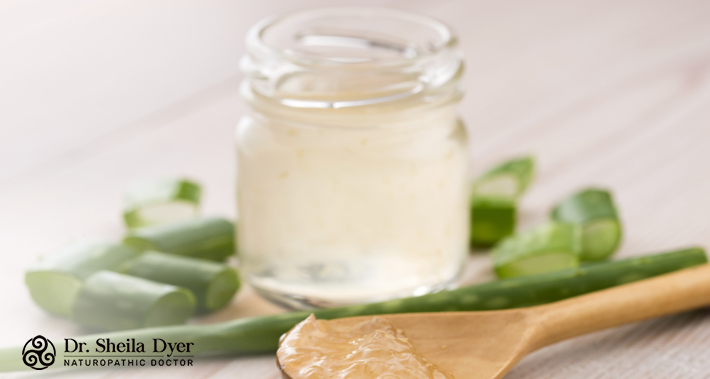Having a chronic cough is no fun.
It’s uncomfortable, disruptive, and can make it difficult to sleep.
Additionally, since the COVID-19 pandemic, having any cough can make people suspicious of you.
They’ll stay suspicious even when you’ve explained that you’re not sick, it’s just due to dust or dry air irritating your throat.
While the extra space strangers give you when you have a cough could be a plus, generally they are not fun to deal with.
If you have a chronic cough which you can’t seem to kick, you might consider booking a virtual naturopathic consultation to help figure out how to deal with it.
I’m Dr. Sheila Dyer, a naturopathic doctor in Toronto.
Today, we’ll look at what a cough really is, common cough triggers, and some natural solutions which may offer some relief.
Stay on this page to find out more.
What Actually Is A Cough, Anyway?
A cough is a pulmonary reflex which is triggered by irritation in your throat or airway.
Irritation can be caused by dust particles, mucus, organisms such as viruses or bacteria, or even cold, dry air.
As a result of the irritation, a signal is sent to your brain.
This causes the muscles in your abdomen and chest to contract and vigorously push out air from the lungs.
The goal of this, of course, is to expel the irritant.
Most of the time, if you are sick with a cold, flu, or COVID, the cough will last the duration of your illness.
But sometimes they stick around much longer.
If your cough lasts eight weeks or longer, it’s considered to be chronic.
More than just annoying, chronic coughs can disrupt your sleep, and result in feeling faint, vomiting, and even fractured ribs.
Symptoms of chronic cough including:
- Trouble breathing, wheezing
- Feeling mucus in your throat
- Sore throat
- Runny, stuffy nose
- Hoarseness
- Coughing up blood
What’s Causing Your Chronic Cough?
If you have a cough that won’t quit, it’s seldom the only issue which needs to be addressed.
Most people with chronic cough will also have other issues which need attention.
In this section, we’ll review some of the most common causes of coughs.
1. GERD
GERD stands for gastroesophageal reflux disease.
It’s a severe and chronic form of heartburn.
GERD occurs when stomach acid gets into your esophagus resulting in irritation and a burning sensation.
If you are experiencing heartburn multiple times during the week, you may have GERD.
In addition to a chronic cough, symptoms of GERD include:
- A sour taste in your mouth
- The feeling of burning in the chest or throat
- Burping
- Bloating
- Trouble swallowing
- Erosion of your tooth enamel
RELATED: How To Stop Making Your GERD/Acid Reflux Worse
How Can Naturopathy Help?
A naturopathic approach to providing treatment for GERD involves getting to the underlying cause of the condition.
The aim is to:
- Rebalance acid levels
- Strengthen the lower esophageal sphincter, and
- Alleviate irritated mucous membranes
A naturopathic approach to GERD will start with changing some aspects of your lifestyle, and recommendations may include:
- Eat smaller meals
- Refrain from exercise directly after meals
- Avoid foods which you know cause stomach irritation
- Not laying down after meals
- Sticking to bland foods such as toast, especially you’re your symptoms are flaring up
- Don’t drink fluids at the same time as meals
Some nutritional supplements which your naturopath may recommend could include:
- Curcumin
- Probiotics
- Slippery elm
- Melatonin (at bedtime)
- Licorice root
- Aloe vera
RELATED: What Is Melatonin?
2. Asthma
You probably know someone who has asthma.
You might even have it yourself.
But do you know what that really means?
Asthma is a lung disease which causes breathlessness due to airway obstruction.
Symptoms include tightness in the chest and a dry cough, which lead to wheezing and difficulty breathing.
It’s an inflammatory condition which is due to exposure to different triggers, which can include:
- Infection
- Animal dander
- Chronic stress
- Certain foods
- Pollen
- Chemicals
- Mould
- Use of certain over the counter medications
- Food additives
- Changes in weather and humidity
RELATED: How Does Stress Affect Your Eating?
RELATED: Naturopathic Solutions For Stress And Burnout
In non smokers, asthma is one of the biggest causes of chronic coughs.
How Can Naturopathy Help?
Naturopathic approaches to managing asthma are often used alongside conventional asthma treatments.
The goal is to identify the underlying cause of your asthmatic symptoms and take measures to mitigate them naturally.
If you do have an asthma attack, however, you still need your puffer or inhaler.
These devices contain vital, life saving medication designed to prevent your airway from becoming obstructed during an attack.
Naturopathic remedies can help reduce the need for these inhalers.
It’s not a good idea to stop carrying them entirely, however, unless your doctor advises that it’s okay to.
At the present time, although symptoms can be managed, there is no cure for asthma.
A naturopathic approach to asthma may involve tests to determine allergies and nutritional deficiencies, followed by a treatment plan which could include:
- Lifestyle modifications
- Dietary modifications
- Suggestions for vitamins and supplements
3. Postnasal Drip
Postnasal drip is also known as “upper airway cough syndrome”.
It refers to mucus that accumulates in the back of the nose and mouth.
This can happen because of swelling and inflammation of the nasal passages due to allergies, bacterial or viral infection, or other irritants.
Your body needs some mucus.
It helps trap foreign pathogens, prevent infection, and keeps areas such as your nose, throat, and airways moist.
Usually when you produce mucus in your nose it eventually mixes with saliva, and you swallow it.
However, when you produce excess amounts, or it’s thicker than average, it can accumulate.
When this happens, it can lead to a runny nose, or run down the back of your throat resulting in postnasal drip.
How Can Naturopathy Help?
There are a variety of ways to approach postnasal drip with naturopathic medicine.
Inhaling eucalyptus oil can help alleviate chronic cough due to postnasal drip.
You won’t even need an oil diffuser for this.
Instead, you can add a few drops of oil to boiling water to get the same effect.
Another approach is to remove two common allergens from your diet: dairy and wheat products that contain gluten.
Then you can monitor your symptoms to see if they improve.
Irrigating your nasal passages with a saline spray or through the use of a neti pot can also help to alleviate symptoms.
Book Your Appointment With Dr. Sheila Dyer, ND, Today
Do you have a cough you just can’t get rid of?
Are over the counter cough syrups only providing temporary relief, or even worse, none at all?
If you’re tired of cough remedies that only temporarily mask the problem, but don’t actually help long term, it might be time to give naturopathic medicine a try.
I’m Dr. Sheila Dyer, ND, a naturopathic doctor in Toronto, and I can help.
If you’re currently dealing with a chronic cough or other symptoms and don’t feel well enough to make a trip to my clinic, I also offer virtual appointments.
Book your consultation with me today, and let me help you put more than just a “band aid” on your chronic cough.
If you have questions about naturopathic medicine, or would like to start with your first consultation, contact me, and let’s book an appointment.
Dr. Sheila Dyer, ND1080 Dovercourt Rd,
Toronto, ON M6H 2X8
(416) 554-5135
► https://g.page/DrSheilaDyerNd
Dr. Sheila Dyer is a Naturopathic Doctor and a practicing registered nurse offering holistic healthcare with a scientific focus

